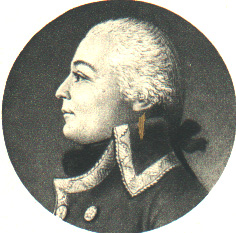François Joseph Westermann facts for kids
Quick facts for kids
François Joseph Westermann
|
|
|---|---|

Physiognotrace portrait by Gilles-Louis Chrétien
|
|
| Born | 5 September 1751 Molsheim, France |
| Died | April 5, 1794 (aged 42) Paris, France |
| Allegiance | |
| Service/ |
Army |
| Years of service | 1767–1773 1792–1794 |
| Rank | General of brigade |
| Battles/wars |
|
François Joseph Westermann (born September 5, 1751 – died April 5, 1794) was a French soldier and leader during the French Revolution. He is famous for being a key commander for the French Republic during the early parts of the War in the Vendée.
Early Life and Revolutionary Role
Westermann was born on September 5, 1751, in Molsheim, a region in France called Alsace. In 1767, he joined the army, becoming a hussar (a type of cavalry soldier). He left the army six years later as a non-commissioned officer.
By 1788, he worked briefly at the stables of the Count of Artois in Paris. Later, he returned to Alsace to work for the city government of Strasbourg. Westermann strongly supported the French Revolution. In 1790, he became a clerk for the city government of Haguenau. After being briefly held for causing unrest in Haguenau, Westermann moved to Paris in May 1792. There, he became a close friend and supporter of the revolutionary leader Georges Danton.
Westermann played an important part in the overthrow of the French monarchy on August 10, 1792. During this event, he led a group of citizen soldiers called fédérés in the attack on the Tuileries Palace. After this, Westermann rejoined the army. He went with General Charles François Dumouriez on his campaigns with the Army of the North and the Army of the Ardennes. He also helped Dumouriez in talks with the Duke of Brunswick.
Westermann served under Dumouriez during the invasion of the Netherlands. He was notably involved in the Siege of Breda in February 1793. However, he was arrested in April 1793 after General Dumouriez switched sides. Even though Jean-Paul Marat accused him to the National Convention, Westermann proved his innocence. He was then sent as a general of brigade to stop the Revolt in the Vendée.
Fighting in the Vendée War
Westermann became known for his great bravery, bold battle plans, and harsh treatment of the rebels. On May 18, 1793, he was made commander of the leading forces of the Army of the Coasts of La Rochelle. He defeated the rebels at Parthenay on June 20 and then captured Châtillon on July 3.
After losing the First Battle of Châtillon, Westermann was temporarily removed from his command. He was brought before the National Convention but got his command back on August 29.
After fighting in the Second Battle of Châtillon, Westermann received a command in the Army of the West. He faced defeats at Croix-Bataille and Entrames. However, he later defeated the Vendéens at Beaupréau and Granville. In December 1793, he completely destroyed the Catholic and Royal Army at the Battle of Le Mans and the Battle of Savenay.
There is a famous, but debated, letter that Westermann supposedly wrote to the Committee of Public Safety. In this letter, he was said to have written:
- "There is no more Vendée, Republican citizens. It died beneath our free sword, with its women and its children. I have just buried it in the swamps and the woods of Savenay. Following the orders that you gave to me, I crushed the children beneath the horses' hooves, massacred the women who, those at least, will bear no more brigands. I do not have a single prisoner to reproach myself with. I have exterminated them all..."
Many historians believe this letter was never actually written by Westermann. The rebellion was still ongoing, and thousands of Vendéen prisoners were held by Westermann's forces when the letter was supposedly written. Also, killing civilians would have gone against the specific orders Westermann received from the Convention.
After his victories, Westermann was called to Paris in January 1794. As a friend and supporter of Danton, he was accused and sentenced to death by the Revolutionary Tribunal. He was executed by guillotine along with Danton's group on April 5, 1794.
Westermann has been shown in films. He was played by Jacques Villeret in the 1983 movie Danton. He was also played by Eduard von Winterstein in the 1921 movie of the same name.
 | Anna J. Cooper |
 | Mary McLeod Bethune |
 | Lillie Mae Bradford |

